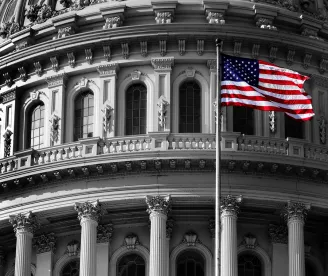COVID-19 is making a comeback in America this summer, complicating President Donald Trump’s re-election campaign and governors’ plans to reopen their economies. A wave of new hospitalizations around the country is threatening to dampen hopes for a quick economic recovery in the wake of this spring’s pandemic-related lockdown, giving new urgency to discussions among federal lawmakers about priorities for the next significant federal relief package. Members of Congress are clashing over competing versions of police reform legislation put forth by Republicans and Democrats in response to the national outcry over the killing of citizen George Floyd, raising fears that surging partisan tensions may spill over into discussions set to begin after Independence Day for the purpose of crafting an economic stabilization bill that can be signed into law next month by the president.
Topics covered today include: tax and economic development, health, international trade, government oversight and US states development.
Via Bloomberg:
The COVID-19 pandemic is tearing through the US heartland, setting records for hospitalizations and forcing businesses to rethink their plans to reopen as new modeling predicts the virus will kill 180,000 Americans by October.
With the US seeing one of its highest-ever increases in cases Wednesday, some states took drastic measures, imposing face mask orders and internal quarantines. The country recorded more than 34,500 new infections for a second day, rattling markets as numbers neared the peak of 36,188 set April 24, when the virus was coursing through New York.”
The resurgence of the virus raises the stakes for bipartisan negotiations set to begin next month on a successor to the CARES Act, the US$2.2 trillion emergency measure enacted March 27 as the American economy was being shut down in an attempt to slow the spread of infections. Leaders of the two parties in Washington have offered vastly different visions for the size and content of the upcoming legislation, with Senate Majority Leader Mitch McConnell (R-KY) urging that the package be limited to US$1 trillion, and congressional Democrats offering proposals that would total nearly five times that amount.
Prospects may be rising for the inclusion of a bipartisan “fix” for the looming multiemployer pension funding crisis in the next COVID-19 measure, a cause championed by Senators Rob Portman (R-OH) and Sherrod Brown (D-OH), House Ways & Means Committee Chairman Richard Neal (D-MA) and other veteran lawmakers, as well as outside stakeholders such as the Retirement Security Coalition. Bloomberg reports:
Portman says he and other members of the Senate Finance Committee are interested in beginning talks with House Democrats to reconcile their proposal to address multiemployer pension reform with a plan Democrats inserted into [the HEROES Act] that passed the House in mid-May.
‘I think there is an opportunity here for us to come together,’ Portman says in outlining an approach to reaching a deal on the matter this year.
Portman says the House plan as written is a ‘nonstarter’ with the Senate but still reflects more openness to Senate pension proposals than previously.
The pension provision in the HEROES Act ‘has many similarities’ structure-wise to Senate plans; ‘Let’s build on those,’ he said in remarks on the Senate floor.
Portman said he and Democratic Senator Sherrod Brown back a plan using a framework developed by a joint House-Senate committee in the last Congress. . .[The] Senate is expected to take up its own new economic stimulus when lawmakers return from an extended break July 20.”
The House of Representatives will be in session today to begin consideration of police reform legislation authored by Representative Karen Bass (D-CA). Republicans in the Senate attempted Wednesday to begin debate on an alternative measure authored by Senator Tim Scott (R-SC), but were blocked by the chamber’s Democrats, who wanted assurances from McConnell that the scope of the bill would be broadened.
Tax and Economic Development Updates
Yesterday, the International Monetary Fund projected that the U.S. economy would shrink by 8% as a result of the economic fallout stemming from the COVID-19 pandemic – a drop that is more than three times the 2.5% contraction experienced during the 2009 Great Recession. Additionally, the Federal Reserve today is set to release the results of its stress testing – results expected to lead to a further drop in banks’ share prices. This gloomy economic forecast – in conjunction with the recent downward trend in the stock market driven by a resurgence of COVID-19 cases throughout the country – will likely keep the pressure on lawmakers to take action and pass another economic relief package sooner than later. Among the issues receiving attention on Capitol Hill: a second round of economic impact payments. Notably, though, while the White House appears largely supportive of providing more stimulus payments to taxpayers, The Hill reports that “[m]any GOP senators, on the other hand, think a second round would be a huge waste of money.” For example:
-
Senator Pat Toomey (R-PA): “I expressed a lot of skepticism about the wisdom about doing another big spending bill.”
-
Senator Marco Rubio (R-FL): Acknowledged that several of his colleagues “urged caution moving forward” with the payments.
-
Senator John Cornyn (R-TX): Agreed that the first round of US$1,200 checks “was necessary at the beginning” of the crisis when people might have had to wait for state and federal unemployment benefits.
There are also continued discussions about pursuing relief targeted at specific industries as part of negotiations over the next legislative response to COVID-19. For example, Bloomberg is reporting that Senator Cornyn, along with 10 Senators from oil states, are pushing to include “aid [for] domestic producers during the coronavirus pandemic.” The legislation in question – S. 4041 – was introduced earlier this week and would: (1) allow for immediate expensing of certain direct and indirect costs, including inventory; (2) reduce the required biweekly deposit of certain motor fuel excise taxes; and (3) permit a 100% deduction for 2020 intangible drilling costs.
In addition to the focus on forward-looking economic stimulus measures, there continue to be ongoing efforts to implement those measures that have already been enacted. In fact, yesterday, the Treasury Department released updated FAQs for the Coronavirus Relief Fund (CRF) in the CARES Act. These updates supplement the FAQs issued on April 22, 2020, and address questions related to eligible expenditures and administration of fund payments. By way of reminder, the US$150billion CRF was established to provide payments to state, local, and tribal governments impacted by COVID-19.
Health Updates
As the US set a new one-day high record of COVID-19 cases, the administration announced the closure by June 30 of the remaining 13 drive-through testing sites being run in Illinois, Colorado, Pennsylvania, New Jersey and Texas. In the initial stages of the pandemic, the federal government established and provided funding for 41 testing sites across the country. The administration defended the decision by explaining that the sites were always intended to be temporary, and encouraged states to continue to run their own separate systems. Assistant Secretary for Health Brett Giroir also said on a call with reporters that the Department of Health and Human Services has financial agreements with nearly 1,600 pharmacies to conduct testing, and 1,400 community health centers are conducting testing with funding from the Health Resources and Services Administration . The decision drew criticism from some in Congress, including Senator John Cornyn (R-TX), whose state has seen a sharp increase in cases. In a statement he said, “I believe that they need to extend that federal support in Texas, at least until we get this most recent uptick in cases addressed.” Senate Health, Education, Labor and Pensions Committee Ranking Member Patty Murray (D-WA) issued a press release that called on the president to “reverse this clearly counterproductive step immediately.”
The chairmen of the House Committees on Ways and Means, Energy and Commerce, and Education and Labor – Representatives Richard Neal (D-MA), Frank Pallone (D-NJ) and Bobby Scott (D-VA) respectively – introduced legislation making changes to the Patient Protection and Affordable Care Act. The Patient Protection and Affordable Care Enhancement Act would- expand eligibility for premium tax credits beyond 400% of the federal poverty line; renew the ACA’s original expanded federal matching for states that adopt the Medicaid expansion and progressively reduces the administrative Federal Medical Assistance Percentage for states that do not expand; provide funding for outreach and enrollment for insurance plans on the marketplace exchange; and restrict short-term limited duration insurance plans. The bill also includes drug-pricing negotiation provisions included in H.R. 3, the Lower Drug Costs Now Act, which passed the House on December 12, 2019. A section-by-section from House Democrats can be found here. Leaders announced their intention to hold a vote on the bill on Monday. The legislation is largely a messaging exercise, as the Republican-controlled Senate is highly unlikely to take up the bill in their chamber. Nevertheless, House Majority Leader Steny Hoyer (D-MD) said, “I hope the Senate will not ignore this bill, once it has passed the House, and I urge Republicans to join us in making quality health care more affordable for more Americans.”
Trade Updates
On Wednesday, the US Department of Agriculture (USDA) and the Food and Drug Administration (FDA) issued a joint statement criticizing recent efforts by some countries to apply restrictions on US food exports over concerns with COVID-19 transmission. The USDA and FDA assert “There is no evidence that people can contract COVID-19 from food or from food packaging. The U.S. food safety system, overseen by our agencies, is the global leader in ensuring the safety of our food products, including product for export.” Their statement comes as a rebuke to China, which recently increased inspections of US meat and seafood exports after the virus was reportedly detected on a salmon chopping block at a Beijing food market. Cities across China removed salmon products from their shelves in response, and the government has stepped up time-consuming meat inspections since.
Also Wednesday, President Trump signed a memorandum on “Protecting the United States Lobster Industry.” The memo calls out China’s seafood purchasing commitments and agreements to make available exclusions from retaliatory tariffs for imports of US lobster as part of the Phase One trade deal signed earlier this year. In addition to expanding support for those members of the US lobster industry that may be impacted by retaliatory tariffs, the trade deal requires the US Trade Representative to provide a monthly report on China’s progress in meeting its seafood purchasing agreements under the Phase One deal and the value of Maine and US lobster exports beginning in June 2020. It also directs the US Trade Representative to request a report by the US International Trade Commission on the impacts of the Comprehensive Economic and Trade Agreement (CETA) between Canada and the European Union (EU) may have had on the US lobster industry.
Later today, the House of Representatives is scheduled to vote on a rule that would effectively block any debate or vote on a proposed resolution on US withdrawal from the World Trade Organization (WTO). As reported yesterday, US law permits Congress to vote every five years on WTO withdrawal. While such a measure is not expected to pass, House leaders appear poised to block consideration of the measure – originally introduced by Representatives Peter DeFazio (D-OR) and Frank Pallone, Jr. (D-NJ) – altogether, avoiding what would likely become a politically sensitive debate on trade more broadly. While a Senate vote on a companion measure filed by Senator Josh Hawley (R-MO) may still proceed, the resolution must be passed by both chambers for withdrawal to occur. The relevant law only allows for such a vote every five years, so the House action would effectively block any such vote until at least 2025.
Oversight Updates
The Congressional Oversight Commission – one of the bodies established by the CARES Act to oversee implementation of the law – met with Treasury Secretary Steven Mnuchin and Federal Reserve Chair Jerome Powell yesterday to discuss the design and implementation of coronavirus-related lending programs, according to this statement from commission member Representative Donna Shalala (D-FL).
A Virginia couple was arrested this week at JFK airport as they were attempting to flee to Poland after obtaining over US$1.4 million in Paycheck Protection Program (PPP) loans. According to court documents, the couple submitted eighteen loan applications to twelve financial institutions in the names of four companies, for which they falsely claimed to have filed payroll tax returns. The woman made her first appearance in federal court yesterday on a charge of conspiracy to commit wire fraud based on the allegedly false loan applications.
State Updates
As mentioned earlier this week, Connecticut Governor Ned Lamont (D) was seeking partnerships with neighboring states to implement a regional quarantine. Yesterday, New York Governor Andrew Cuomo (D) and New Jersey Governor Phil Murphy (D) joined Governor Lamont in announcing that their three states will require visitors from states with high infection rates to quarantine for 14 days on arrival. States subject to the quarantine include: Alabama, Arkansas, Arizona, Florida, North Carolina, South Carolina, Texas, Washington and Utah.
The new quarantine order also applies to tristate residents returning from those targeted states, to be determined by the number of new cases per 100,000 people or the percentage testing positive. Visitors who are found violating the order could face fines of US$1,000 for a first violation and US$5,000 for repeat offenses.
Last week, ahead of schedule, Indiana Governor Eric Holcomb (R) moved the state into Stage 4 of its reopening plan. Yesterday, the governor defended his decision to move into its next phase even with positive COVID-19 cases increasing in his state. The Indiana State Department of Health said 281 more Indiana residents have been diagnosed with COVID-19, bringing the state’s confirmed total to 43,140. During Stage 4, office buildings, retail stores and malls are allowed to open at full capacity. Restaurants can have up to 75% capacity in their dining rooms. Bars, nightclubs, bowling alleys, movie theaters and amusement parks can open at 50% capacity. Casinos are also open at reduced capacity and with approval from the Indiana Gaming Commission. Social distancing guidelines remain in place, and face coverings are still recommended.
Meg Gilley and Genevieve Bresnahan contributed to this article.







 />i
/>i
